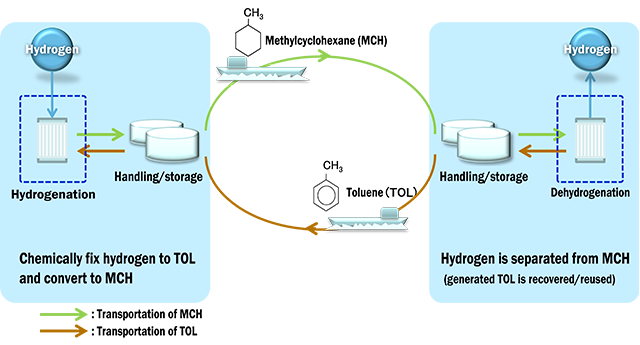Research background
The New Strategic Energy Plan, approved by the Cabinet in April 2014, and the resulting Strategic Roadmap for Hydrogen and Fuel Cells formulated by the Ministry of Economy, Trade and Industry stipulate accelerating efforts towards the realization of a hydrogen society that utilizes hydrogen in everyday life and industrial activities. These indicate the necessity of integrated efforts to expand hydrogen demand, such as the full-scale introduction of hydrogen power generation and the construction of hydrogen supply chains to meet the demand.
This hydrogen supply chain demonstration project is implementing with subsidy from NEDO in response to these demands. AHEAD uses the Organic Chemical Hydride Method—which established the basic technologies for one of the methods of hydrogen transportation and storage—and aims to solve the challenges facing the practical application of hydrogen energy supply chains.
[Our Challenges]
- Accumulation of the know-how and expertise needed to design, construct, and operate supply chains
- Verification of the durability and availability of hydrogenation and dehydrogenation plants in environments similar to a commercial supply chain

- Confirmation of the effectiveness of a hydrogen supply from overseas through actual operations of a supply chain
Research objectives & details
To work on the following research topics, the end goal being the practical application of an energy supply chain based on the Organic Chemical Hydride Method
- The performance verification of a hydrogenation plant as a commercial plant, and the identifying of challenges and the examination of their countermeasures when applying basic technology to commercial plants
- The performance verification of a dehydrogenation plants as commercial plants, and the identifying of challenges and the examination of their countermeasures when applying basic technology to commercial plants
- Planning for the construction and operation of a demonstration supply chain, and related simulations/surveys/business feasibility studies. Accumulation of the know-how and expertise needed to design, construct, and operate future commercial supply chains
- Confirmation of the effectiveness of a stable hydrogen supply from overseas through the long-term operation of a demonstration supply chain (expecting the operation to continue for approximately one year), and obtain operation record data to be used in the research in 1–3.
The Organic Chemical Hydride Method
Hydrogen, a light gas, is chemically fixed to TOL through the hydrogenation reaction of TOL. It is converted to MCH, a liquid chemical at ambient temperature and pressure, then stored and transported. Hydrogen is extracted through a dehydrogenation reaction at the consumer site, while generated TOL is recovered and reused as a hydrogen carrier.

